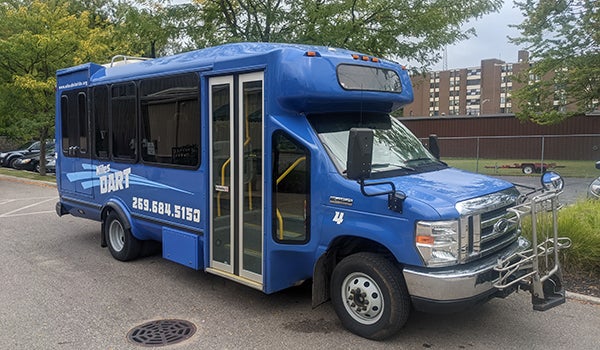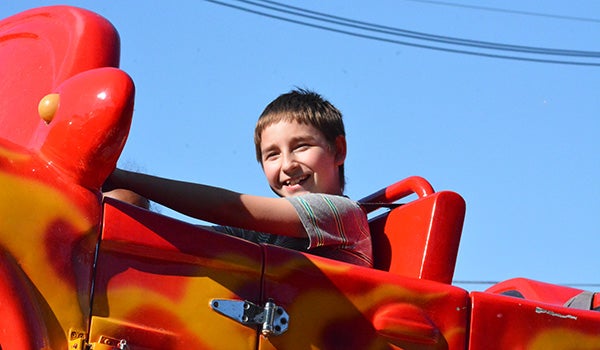Cass FFA growing
Published 9:23 pm Wednesday, December 21, 2011

From left: Cameron Hayden, Courtney Kuemin, Ashley Rogers, Hannah Deubner, Emily Waldschmidt and adviser Carrie George.
“It’s striking to me, as a 1969-’73 alumnus of FFA. We had zero young ladies in the class. What a progressive organization.”
— Commissioner Charlie Arnold, R-Cassopolis
Cass County commissioners Dec. 15 met homegrown FFA leaders and heard about expansion plans for a nationally-recognized program which boasts some of the most diverse facilities in Michigan.
Tiffany Rogers of Niles told commissioners about her year as Eastern Region national vice president.
“I represented more than half a million members,” she said. “We traveled 310 days, over 120,000 miles in the United States to 37 states and we went overseas to Japan. By far, one of my favorite parts was going to schools, visiting members in their own environment. That local chapter level is the heart of our organization. It all started for me in the Cassopolis FFA chapter.”
“It motivates us all to see one of our former Cassopolis members up there speaking” at the national convention, Sentinel Cameron Hayden said. “Watching Ashley and Hannah at nationals was another highlight.”
Agriscience teacher Carrie George recalled that “FFA” stood for Future Farmers of America” when it started in 1928 “to train farm boys. It became FFA in the 1980s as they realized they were going to have students moving into broad careers in agriculture and natural resources, not just production agriculture. Today, the mission statement is to develop students’ potential for community leadership, career growth and career success. Education right now pushes three components: rigor, relevance and relationships. The Michigan Merit Curriculum evolved from those three things. We’ve had that model for close to 100 years. Our three components are the FFA, a student leadership organization; rigorous classroom instruction; and SAEs, or supervised agricultural experiences which make it relevant in the real world while they build relationships.”
As the only remaining FFA program in Cass County, Cassopolis offers a half-day, year-long program for students from Cass and Berrien counties which has been attended by Dowagiac, Edwardsburg, Marcellus, Niles and Brandywine.
“We’re hoping to expand,” George said, “possibly filling a vacant building left in the school district from the new K-6 building. Expanding, we could tie in rigorous math and science careers with agriculture.”
Cassopolis offers “unique facilities” thanks to its self-sufficient program, George said. “They’re as diverse as any in Michigan” and include a barn on M-62 going toward Edwardsburg filled in the summer with student hog, sheep and cattle projects; a 60-acre land lab; fund-generating acreage that is farmed; and an automated greenhouse where they raise poinsettias.
George has tried to find ways to grow food that can be served in cafeteria meals “so students can see the process starting from a seed. And, of course, the Cassopolis FFA is the shining star in our program. Our chapter has had two national officers,” Rogers and, five years ago, Ryan Peterson.”
Michigan has had only seven. We’ve had three national gold leadership teams,” including one this fall, “17 state leadership conference champions, 25 state officers and just this past year celebrated 75 years in existence.”
Winners of the national FFA parliamentary procedure career development event were announced Oct. 21 at the annual awards banquet in conjunction with the 84th National FFA Convention in Indianapolis.
Cassopolis FFA chapter received a gold award. Members of the Cassopolis team were President Ashley Rogers, Vice President Hannah Deubner, Elizabeth Hein, Desirae Massey, Molly Moroz and Rachel Mroz.
They were coached by Bill Butcher and FFA assistant advisor Cheryl Rogers.
Individuals from the Cassopolis team received outstanding chairperson, Ashley Rogers, and outstanding secretary, Hannah Deubner.
The national FFA parliamentary procedure career development event tests a student’s ability to effectively communicate ideas during a meeting.
Components include a general knowledge exam, a 10-minute demonstration, oral questions and written minutes of the demonstration.
“We want to start a garden club for students at Sam Adams to get them involved in agriculture,” Deubner said. A backpack food program involves four churches.
They were introduced by Commissioner Skip Dyes, R-Calvin Township, who assists the program.






